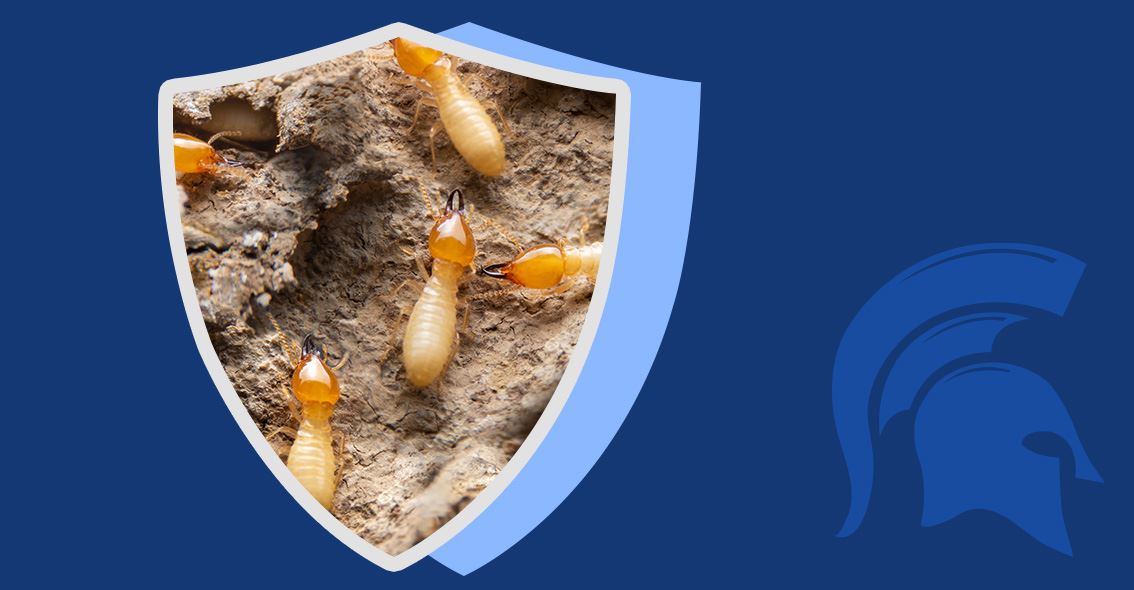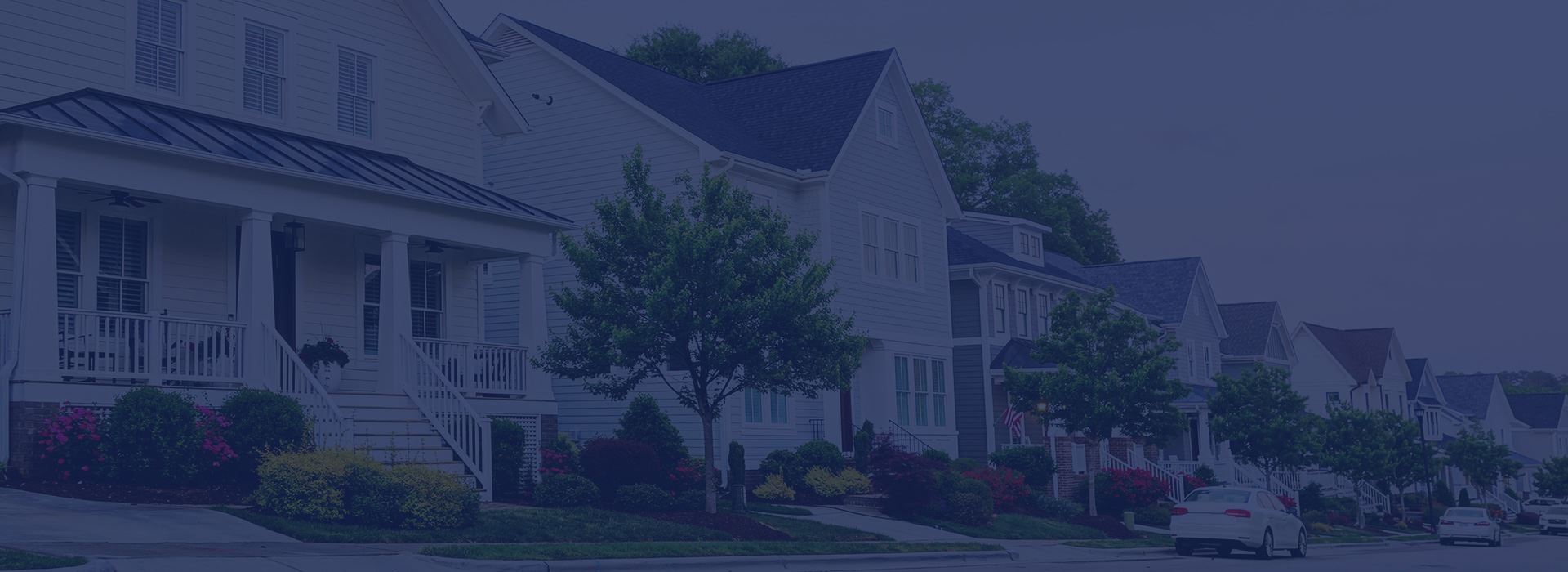
Termite Control in Newnan
Save Yourself Thousands of Dollars with Termite Treatment in the Atlanta Metro Area
Termites are a common springtime nuisance in households across the U.S. They spend the winter building colonies deep within wooden structures of homes and other buildings, beginning their breeding cycle in spring. Warm air and heavy rains instigate the swarming cycle, and winged reproductive termites leave the colony in search of mates to form new colonies. Homeowners should always be on the lookout for signs of termite infestations because, if left untreated, they can quickly spiral out of control and render your home temporarily unavailable.
Termite Damage
Termite damage can be extensive. It costs Americans an estimated $5 billion a year — that’s more than fires and flooding combined. Signs of damage can range from moderate tunneling in walls and furniture to severe, unlivable structure damage. Subterranean and dampwood termites usually cause damage similar to water damage, including buckling wood and swollen floors.
Drywood termites cause damage that produces maze-like cracks and tunnels in walls and furniture. Unfortunately, damage usually goes unnoticed until it is too late and expensive repairs are required.

Protect your home or business by scheduling an appointment today. We offer free estimates for our termite services.
Termite Types
There are three sub-types of termites frequently seen in and around homes, and all pose threats to the structure of a building:
- Subterranean termites: Subterranean termites build their colonies underground, coming up for food using a vast network of mud tunnels and chambers. In the spring, the existing colony will send out swarmers in search of mates and new colony sites. Signs of these termites include piles of cast wings from swarmers and mud tubes running up the building’s exterior foundation.
- Drywood termites: Drywood termites rely solely on the wood structures in which they live. They do not require any contact with the soil and may be harder to spot. Unlike other termites, they do not require much moisture to colonize inside wooden structures. They are often found in attic wood, which is dryer. Excrement deposits outside the colony, called frass, are a sign of a drywood termite infestation. Unfortunately, frass usually indicates an infestation already caused significant damage.
- Dampwood termites: Dampwood termites are similar to subterranean termites in that they need moisture to thrive; however, they are much larger than the subterranean species. These termites inhabit damp, rotting wood, and typically reside in moisture-ridden basements, not in the soil. Frass is not commonly seen with these termites because the moisture in the wood allows the frass to accumulate inside the colony. Winged swarmers and wood damage are the easiest ways to spot this type of termite.
6 Signs of Termites in Your Home
Signs of a termite infestation include:
- Swarmers: Flying termites near windows, doors, or light sources.
- Discarded Wings: Shed wings found near entry points.
- Mud Tubes: Pencil-sized tunnels on foundation walls or wooden structures.
- Damaged Wood: Hollow-sounding or blistered wood.
- Frass: Pellet-like droppings resembling sawdust or coffee grounds.
- Clicking Sounds: Rustling or clicking sounds from walls or wooden structures.
If you notice any of these signs, it's crucial to contact our professionals for a thorough inspection and appropriate treatment options.
Termite Treatment & Prevention
The best method for treating termites is prevention. Schedule professional inspections to look for early signs of termites and place monitoring devices around the home. Treating plumbing leaks in the home will rob dampwood and subterranean termites of much-needed moisture. Bait stations lure termites with poisoned food, which will then be brought back to the colony. This is effective at exterminating small termite colonies but will not work when large populations have already caused severe damage.
Newer homes can be built using termite-treated wood, and existing wooden structures can be treated with termiticide. Larger colonies need more drastic measures and utilize a combination of methods to effectively target habitat, food sources, and entry points. Most professional pest control services, including termite control, provide ongoing monitoring of the property after treatment.
Schedule an appointment for Newnan termite control by calling (770) 212-9104 or contacting us online.

Why Choose Centurion Pest Management?
-
Trained and Certified TeamOur licensed exterminators go through our extensive training program to ensure our team is knowledgeable when it comes to safely and effectively remedying pest issues.
-
Your Satisfaction is Our #1 PriorityOur goal is to provide you with the best protection for your home or place of business, while leaving the smallest footprint behind.
-
Over 20 Years of ExperienceFor years, our team at Centurion Pest Management has been providing top notch customer service, the best products, and the most up to date methods.
Professional Termite Control Services
Professional termite control is the best choice for homeowners who notice signs of termite damage. Avoid combining personal treatments. Incorrect application of commercial termite treatment chemicals can completely negate the effectiveness of professional treatments.
Depending on termite species, a pest control specialist can determine the fastest and most effective plan for dealing with a termite infestation using moisture meters and termite detection systems. Immediate threats will be addressed using insecticides or other chemicals, while baiting treatments eliminate the remaining population over time. After initial extermination, structural modifications and termite barriers may be applied to prevent re-entry.
Centurion Pest Management offers homeowners an in-home visit to assess damage, termite type, and colony locations. Professional control plans are customized based on these factors to effectively penetrate and exterminate each colony. We use the safest methods available in the pest control industry, only using chemicals when absolutely necessary. With over 20 years of experience, Centurion Pest Management is fully equipped to deal with the most challenging termite infestations.
-
"Love working with them. In addition to quality service you are also getting quality employees."They always arrive when they say they will, and they are sure to promptly handle pest related issues if they arise between scheduled visits. They know their industry and are happy to educate their customers on the services they provide and how to minimize- Trisha S.
-
"Thank you! Thank you Centurion!"Your expertise and professionalism displayed as a whole along with the friendly positive attitude of the technician on site is much appreciated. And of course the desired end result was achieved, my home is once again a nice place to play in the lawn.- Paul J.
-
"Prompt, competitively priced, easy to get a hold of, and the pests are GONE."I cannot recommend Patrick enough. He delivers quality customer service that you just don't experience from many places. He is prompt, competitively priced, easy to get a hold of, and the pests are GONE. We've used Centurion for insects and rodents and hav- Julia O.